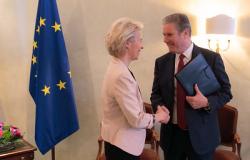After the landslide: What are the prospects for UK-EU collaboration in global development cooperation?

Andrew Sherriff and Andy Sumner explore the rocky road ahead for the new UK government’s relations with the EU.
So, the UK has a new government. What does it mean for post-Brexit UK-EU relations?
In a new brief for ECDPM, we consider the UK election outcome and explore the potential challenges and opportunities for UK-EU collaboration on development.
What happened?
Labour won the election on 4 July with a large majority, as polls had predicted. Labour’s victory, led by Europhile leaders who value multilateralism, could open doors to rebuilding connections with the EU.
But, but, but…
The new government, keen on mending burnt bridges, faces an EU with its own political challenges, changing leadership and shifting priorities – an EU for which relations with the UK are not necessarily a prime concern.
Noisy figures like Nigel Farage still influence UK public opinion, and Brexit has had enormous consequences for how the EU continues to view the UK. Labour and senior UK officials would do well to approach potential collaboration with realism, humility and a longer-term horizon.
 Why does it matter?
Why does it matter?
Firstly, the new UK government will want to rebuild burnt bridges and will be keen – in private at least, and maybe in public – to rebuild its relationship with the EU. But times change – also in Europe. The Labour government will have to rebuild a relationship with a more right-leaning Europe and a more right-wing European Commission, particularly when the full roster of commissioners is approved.
Secondly, the new UK government has a large majority, so things that may have seemed impossible become plausible. However, the Labour government will have a major bandwidth problem – a bad mix of higher debt, weak growth and a need for at least some austerity measures or tax rises, given the dire state of public services.
Thirdly, with relevance to global development policy, many new Labour MPs come with development NGO backgrounds, and the new foreign secretary is an overt Europhile and multilateralist. Additionally, some familiar faces have returned, like Douglas Alexander, former DFID secretary of state, and Gordon Brown’s key advisor, Kirsty McNeill – both elected in Scotland.
What are the challenges?
Firstly, the UK-EU relationship on development cooperation will be almost wholly determined by how well the overarching relationship between the UK and the EU turns out to be. Here, some red lines would need to be redrawn and trust rebuilt.
Secondly, the EU likes to have international structures and agreements, and ad hoc arrangements are more difficult and risky to manage. New structures of some kind would be needed.
Thirdly, the EU and the UK have increasingly shifted away from framing development cooperation solely around poverty alleviation and the Sustainable Development Goals (SDGs), even if the UK was moving back in this direction even before the election.
Fourthly, there is no demand from or clear incentive for development partners to promote better UK-EU collaboration.
But it is not all bad news
Beyond the challenges, we also see four opportunities that may well make for a better and more structured EU-UK relationship in global and development cooperation.
Firstly, the current geopolitical environment – particularly the Russian war in Ukraine, but also a Trump return to the White House – will push a new UK Labour government and the new EU leadership closer together.
Secondly, and related to the first point, the incoming UK Labour government has indicated it would like to have a UK-EU security partnership, and the EU seems keen too.
Thirdly, even before Brexit, the UK was smart enough to know that it could not just support its own institutions and non-state entities to build informal bridges, float policy ideas or have insight.
Fourthly, both the UK and the EU are actually short of cash. Increases in official development assistance in coming years can be wished for, but this seems unlikely. Working together and pooling resources therefore makes sense.
The rocky road ahead
The UK business of putting a government together happens remarkably quickly, but the ongoing change of leadership in the EU (including who will hold the key ‘development-focussed’ portfolio in the European Commission) could extend until beyond Christmas to formally finalise. Indeed, with the EU institutions focussed on getting their leadership approved and appointed in the next few months, things may not move as fast for the UK-EU relationship as some in the UK would want.
Key milestones to see how things are shaping up might be momentum coming out of the European Political Community (EPC), engagement around the new climate finance goal and related discussions at COP29, as well as preparations for the International Conference on Financing for Development in 2025, and UK and EU alignment in G7 and G20 initiatives.
If a new UK-EU security partnership is actually signed in the next 12 months, the type of agreement (political or legal), the kind of language it includes on development cooperation and the type of tangible follow-up undertaken will indicate the direction ahead. Yet big changes in national elections in Europe (France and Germany) will influence the environment for collaboration.
It is against this backdrop that future EU-UK relations, and any particular engagement on development cooperation, have to be forged. Optimistically, small steps to better the EU-UK relationship overall could result in better engagement on multilateral solutions and development cooperation, and this could, in turn, lead to a virtuous circle.
For a more in-depth exploration of these issues, see the full ECDPM brief.
Andrew Sherriff (ECDPM) and Andy Sumner (King’s College London).
The views are those of the authors and not necessarily those of ECDPM or King’s College London.
Keir Starmer via Flickr – CC BY-NC-ND 2.0


